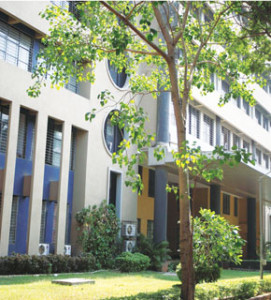
 Dr Prachi Gharpure, Principal, Bharatiya Vidya Bhavan Sardar Patel Institute of Technology (S.P.I.T), Mumbai, believes that there is sufficient demand for quality engineers
Dr Prachi Gharpure, Principal, Bharatiya Vidya Bhavan Sardar Patel Institute of Technology (S.P.I.T), Mumbai, believes that there is sufficient demand for quality engineers
Institutes across the world are coming up with new ways of imparting education.How are you bringing innovation in pedagogy at your institute?
Our primary pedagogy is still classroom teaching but we are trying to use alternate pedagogy for relevant courses such as making use of project based laboratories for computer and electronics subjects. We are also using outside class experience such as “speakers club” for enhancing communication skills. We put students into industry projects right from second year by through our tie ups with several start-ups. We also conduct workshops for circuit design and build for electronics and telecommunication students for skill enhancement.
How important is to have a strong academia-industry linkage for an engineering institute and how it is beneficial to the students?
It is very important to have a sustain-able strong and live linkage with industry. At S.P.I.T we implement this in two ways. First is using the summer internship programme. Although we are still an affiliated college and hence have constrains of university schedule but we have a very vibrant summer intern-ship culture and companies like Micro-soft, Credit Susie, Barkley, JP Morgan, Siemens recruit interns from our college. Secondly, through IIIC initiatives at S.P.I.T we have created an Industry Interaction Laboratory in college where students who intern for start-ups work during not only summer but on all weekends too.
Please share some of the unique initiatives taken by your institutes?How can the gap between industry and academia be bridged?
We have the following initiatives that make us unique.Technology Business Incubator (SP TBI): S.P.I.T‘s mission statement is to promote entrepreneurship and true to the mission we have been running a Business Incubator since 2009. The biggest advantage of such in campus initiative is that we are slowly building a culture of entrepreneur thinking amongst our students. They not only get to interact with budding entrepreneurs on daily basis but also get an opportunity to work with them.
We keenly encourage our students for participating in project (Texas Instrument) competition, coding competition (Amezon, IEEE Extream, ROBOCON)
Strong Student Teacher Connect: We run a unique initiative of offering Teaching Assistantship (TA) to bright students. These TA’s conduct practice sessions for the junior classes.
India may get the full-fledged membership status of the Washington Accord by June, enabling global recognition of Indian degrees and improving mobility of students and engineers. In your opinion, how it is going to help Indian students and engineering education system?
If taken positively, it will pave way for student exchange with credit transfer for many autonomous institutes and private universities. Our UG degree being recognised for international jobs (currently only IIT degree is recognised) will open doors for global placements.

What is the importance of an incubation centre and tells us about your plans to install one?
The importance of these centres is tremendous. We understood this and are running an incubator since 2009. We will establish a DST funded incubator shortly. S.P.I.T’s mission statement is to promote entrepreneurship and true to the mission we have been running a business incubator since 2009. The biggest advantage of such in campus initiative is that we are slowly building a culture of entrepreneur thinking amongst our students. They not only get to inter-act with budding entrepreneurs on daily basis but also get an opportunity to work with them.
Students complain that most engineering institutes pay more attention towards imparting theoretical knowledge rather than giving practical assignments. Has this trend changed in the last few years?
This trend has not changed much in affiliated colleges so far.
How has been your college’s placement in recent years? Do you think there is sufficient demand in the industry for the engineering graduates?
There is sufficient demand for quality engineers. Our placement has been excellent always with above 90 per cent and almost all the placed students get multiple offers. There is enough demand for all the colleges imparting quality education. But the frenzied recruitment trend seen in year 2002-2006 has died and now recruiters are very selective about whom to recruit.
What are the new engineering courses becoming popular?
In new engineering programme – Mecatronics seems to be gaining popularity.
What is your policy expectation from the Government?
One of the most harassing aspect of policies is they change as soon as government or officer in-charge changes. Rarely a long term thought is being given. We in Maharashtra for example are still playing with admission policies for last several years. Also the regulatory authorities, be it in managing approvals, admissions , fees and the university do not work in tandem. This often creates a situation where we find exactly opposing requirements from these authorities.
In India, there are multiple agencies which look into the accreditation but majority of them have failed to bring quality. In your opinion, does accreditation perse helps in enhancing the quality of education?
If accreditation is taken only as a process then it does not help but if it is adapted as life style (which involves mindset change) then it helps because it makes us create processes and mechanisms for quality and quality control of every aspect of education. This could be in teaching learning or in transparency in administration.
Please share your institute’s expansion plans in the coming years? What are the challenges, which you face nowadays?
We have no expansion plans currently at Undergraduate level. But we will surely like to initiate sharply focused PG programmes once we become autonomous. The major challenges are faculty readiness for such an initiative as any such PG programmes will be very closely associated with industry and faculty will have to continuously adapt and evolve to cope with the fast pace of changes that will feature.






















